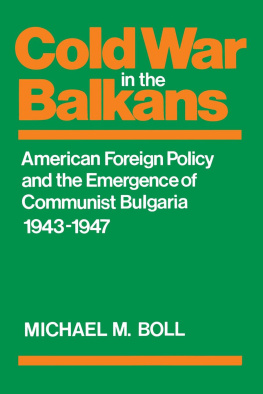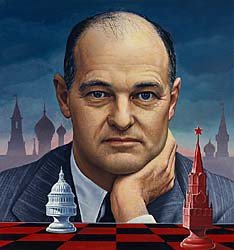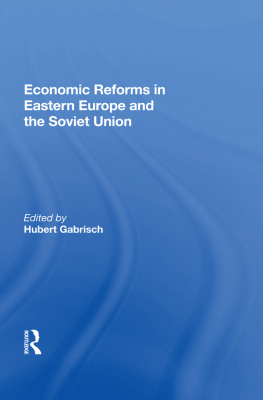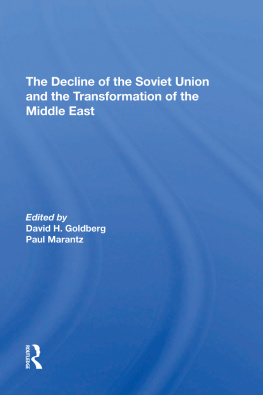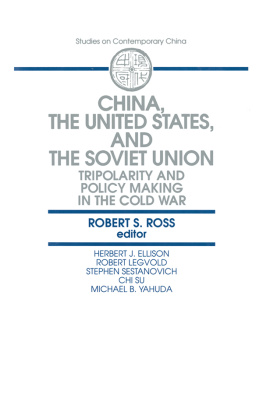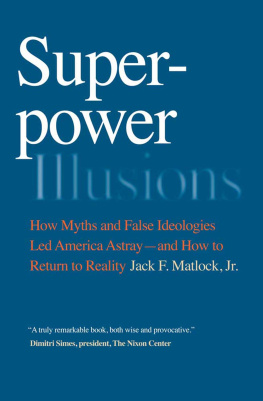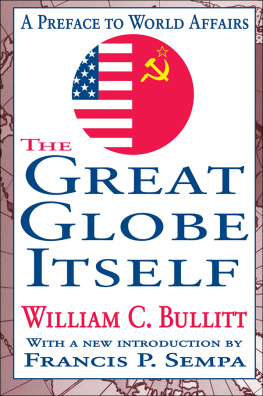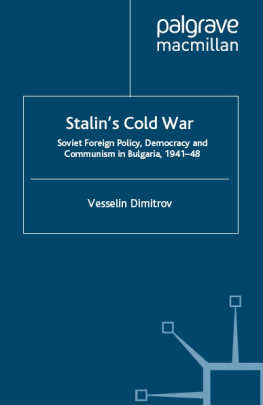Copyright 1984 by The University Press of Kentucky
Scholarly publisher for the Commonwealth, serving Bellarmine College, Berea College, Centre College of Kentucky, Eastern Kentucky University, The Filson Club, Georgetown College, Kentucky Historical Society, Kentucky State University, Morehead State University, Murray State University, Northern Kentucky University, Transylvania University, University of Kentucky, University of Louisville, and Western Kentucky University.
Editorial and Sales Offices: Lexington, Kentucky 40506-0024
Library of Congress Cataloging in Publication Data
Boll, Michael M., 1938
Cold war in the Balkans.
Bibliography; p.
Includes index.
1. United StatesForeign relationsBulgaria. 2. BulgariaForeign relationsUnited States. 3. World War, 19391945Bulgaria. 4. United StatesForeign relations19451953. 5. United StatesForeign relations19331945. I. Title.
EL83.8.B8B65 1984 327.7304977 84-7438
ISBN 978-0-8131-5132-8
Preface
The contemporary American student of the Cold War possesses advantages denied his colleagues of even a decade past. In the last few years, a wealth of materials on American policy as made by both the Department of State and the Department of War has become available in the National Archives and the National Records Center. Equally important, serious and, on the whole, creditable scholarship dealing with the early postwar period has appeared in the various East European states, greatly facilitating the inquiries of students able to read the requisite languages. Bulgarian scholarship well illustrates this development, and even a brief perusal of such journals as Istoricheski pregled (Historical Survey), Voennoistoricheski sbornik (The Military-Historical Collection), and Izvestiia na instituta po istoriia na BKP (The news from the Institute for the History of the Bulgarian Communist party) reveals a wealth of secondary sources little used in the West.
When combined with the numerous collections of documents published by both the Bulgarian Peoples Republic and the Soviet Union, these articles provide the scholar with detailed information on the aims and intricacies of American policy in a key East European state at the wars close. The dynamics of political and economic interaction between Bulgaria, the Soviet Union, and the United States in this formative period can be examined without resort to ascribing abstract motives for American policies. Numerous memoirs written by the more important Soviet generals and diplomats show that the uncertainties about East Europes likely postwar future were not confined to American policy makers. Although the present study concentrates on Bulgaria, the rich materials available for this small state suggest that earlier assumptions that America lacked a policy for postwar Eastern Europe south of Poland will require significant reappraisal.
This examination of American policy toward Bulgaria in the early Cold War began as part of a project in a National Endowment for the Humanities Seminar directed by Thomas Paterson at the University of Connecticut one year after I had spent time studying in Bulgaria under an IREX grant. Although it is primarily a historical study, I also have been guided by practical considerations that confront anyone working directly with American foreign policy past or present. Having served as an analyst for Radio Free Europe in Munich, and later as a Foreign Service officer in Washington, I acutely felt the need for specific studies that might form the background and sketch the parameters of possible change in contemporary American policy toward Eastern Europe. Thus the questions I posed to guide my research transcend those normally associated with a strictly historical study of a time long past. When I spent a year on the policy-planning staff of the Pentagon in 198081, the goal of understanding the opportunities of the present in terms of the successful or abortive policies of the past assumed a more urgent dimension. It is my hope that this book will be of assistance to historians and diplomats alike by offering an interpretation of how the current situation in the Balkans came to be.
It is difficult to single out those individuals and institutions most responsible for education and insights accumulated in more than a score of years. I owe a debt to Thomas Paterson for his enlightened guidance of my initial inquiry and to George Herring for aiding in publication of the results. John Taylor and Robin Cooksin of the National Archives were most helpful in identifying materials needed. I wish to acknowledge the assistance of Stanford University, the Hoover Institute, the National Records Center in Washington, Ivan Duridanov, who ran the Summer Seminar in Sofia in 1979, and Philip Bokov of the Bulgarian Embassy in London, who years ago gave me my first textbook in the Bulgarian language. The Bulgarian Embassy in Washington, a much smaller installation than the corresponding facility in London, was of less help, sending me another copy of Georgi Dimitrovs collected speeches on freedom and democracy regardless of what information I requested.
Cyril Black of Princeton University was most kind in answering a number of inquiries dealing with the involvement of American diplomats in Sofia in the period under consideration. Charles Burdick of San Jose State University and Hugh De Santis of the State Department provided encouragement and suggestions. Several other friends, members of East European Communist parties, provided special insights into the evolution of Balkan Communism, but they must remain unnamed. My students at San Jose State University have been instrumental during the past decade in maintaining the scholarly atmosphere so necessary to prevent snap conclusions and partial inferences when dealing with topics concerning the Soviet Union and Eastern Europe. Finally, I wish to thank my wife, Margaret, without whose encouragement and sometimes benign neglect this study would have not seen the light of day.
Portions of appeared in Diplomatic History and East European Quarterly.
SAN JOSE, CALIFORNIA
Introduction
The mid-1940s were formative in the emergence of an intense East-West rivalry, which has diminished little to the present day. Reflecting upon the defeat of Hitler and its implications, Joseph Stalin informed a visiting American senator in the fall of 1945 that we shall have to find a new basis for our close relations in the future. And that will not be easy.
The history of American foreign policy toward Bulgaria in the wartime and postwar period is important both in charting the local disputes that contributed to the growing suspicion of evil Soviet intentions and in identifying the basic American policy goals that unfailingly underlay each specific dispute between the Allies. The absence of any deep American interest in prewar Bulgaria, the minuscule economic ties between the two nations before 1941, and the somewhat contingent fashion by which Washington became deeply involved in the alternative futures of postwar Bulgaria allow clear insight into the more general principles guiding American participation in postwar East European reconstruction. To a large degree, American involvement in Bulgaria was fortuitous, the result of accidental opportunities in combination with an abiding desire among both military and civilian planners to expand American influence wherever a possibility might present itself.

